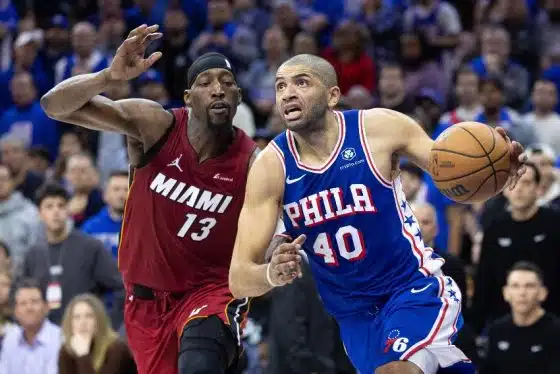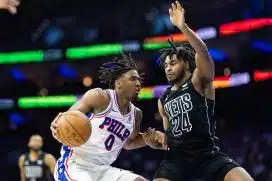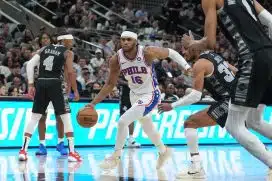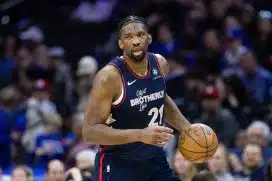By Tim Kelly, Sports Talk Philly editor
This weekend was as special of a two-day stretch as the Philadelphia 76ers have had since 2001.
If we assume that a catastrophe isn't imminent — which may not be a safe thing to do with the Sixers — the team's young core will be complete Thursday night when Markelle Fultz is officially added to a group that already includes Joel Embiid, Ben Simmons and Dario Saric. This would mean that phase one of the process, which was always expected to be the most difficult part, is over. But those who were in favor of the process aren't the only ones who get to move to phase two. Fierce critics of the process (and former general manager Sam Hinkie) will get to move to phase two as well, which means they get to receive pageviews, make money off of and enjoy a Sixers team that they were sure would never exist.
In the fourth paragraph of his 13-page resignation "mainfesto," Hinkie talked about finding innovative ways to compete in a league that regularly lacks overall parity:
A league with 30 intense competitors requires a culture of finding new, better ways to solve repeating problems. In the short term, investing in that sort of innovation often doesn’t look like much progress, if any. Abraham Lincoln said “give me six hours to chop down a tree and I will spend the first four sharpening the axe.”
The idea of tanking to position yourself for top draft picks wasn't a new idea for the "repeating problem" of trying to be competitive in the NBA, but his extended "process" was. Trying to manage the development of young players who are playing with teammates that often weren't NBA caliber players was. Hording second round picks in an attempt to find the next Draymond Green was. Trying to create a winning culture through historical amounts of losing, rather than just hoping for one individual player to be the team's eventual savior, was a new solution.
At the bottom of page three of Hinkie's letter, he had a subheading entitled ''the longest view in the room." When Hinkie resigned on April 7, 2016, the Sixers were 10-68 on the season, and 47-195 since his tenure as general manager had begun. It was easy, in year three of his process, to look at a declining record and suggest that the execution of his plan had been an unmitigated disaster. Heck, many local and national pundits suggested that there never really was a plan.
But Hinkie simply had "the longest view in the room." As he put it, he was still "sharpening his axe" when he resigned, simply leaving his successor, Bryan Colangelo, a chance to chop down the tree.
That 10-68 record, one that led to so-called think pieces that suggested that the Sixers were detrimental to the league, netted the team the No. 1 pick, which they used to select Simmons. When Simmons takes the court for the first time this year, he figures to be a heavy favorite for Rookie of the Year. Without the process that so many "experts" were disdainful of, there would be no Simmons.
Trending: League execs view Sixers as 'aggressive suitors' for J.J. Reddick
If Simmons isn't the Rookie of the Year favorite, his new teammate Fultz will be. Without the process, the Sixers wouldn't have obtained the pick-swap that allowed them to move from pick No. 5 to pick No. 3 this year. Without the process, they wouldn't have selected Michael Carter-Williams, allowed him to enhance his statistics on a terrible team and eventually moved him for the Los Angeles Lakers' 2018 first-round pick, which is also heading to Boston with protections in this deal. If the protections keep the Celtics from receiving that pick, they will instead get the 2019 Sacramento Kings' pick that the Sixers own, which, you guessed it, wouldn't have been in Philadelphia's possession without Hinkie pulling off one of the most one-sided trades in the history of the league.
No one can guarantee the health of Embiid, but he was so dominant in a minutes-restricted 31-game stint, that he may win the NBA's Rookie of the Year Award for the 2016-17 season when it is announced on June 26. A year after trading Jrue Holiday to New Orleans for Nerlens Noel, who missed his entire rookie season, Hinkie was crucified for selecting Embiid, who had a Navicular bone injury that forced him to miss his entire rookie season. Embiid's foot didn't initially heal the way the team hoped, eventually causing him to miss his entire second season as well.
Hinkie could have selected Dante Exum, who drew Kobe Bryant comparisons during draft season, but has averaged just 5.4 points-per-game in his career. Aaron Gordon, who went a pick after Embiid, is a nice bench piece, but that's it. Even someone like Marcus Smart, who has been a very good sixth man for the Celtics, isn't in the same stratosphere as a healthy Embiid. Again, you can't guarantee his long-term health, but Embiid showed in a 31-game stint that he has Hall of Fame level talent. Despite some red flags, Hinkie took the longest view in the room, while critics spent two years saying that Embiid was never going to step on an NBA court, without ever offering who they thought would have been a better pick than taking a chance on someone with Embiid's talent level.
As shortsighted as saying that Embiid would "never" play in an NBA game was, it wasn't half as silly as the often heard "Dario may never come over" take. Once the lifespan of that take being appropriate — if it ever was — expired, critics of the process moved the goalposts. Dario, of course, was eventually going to come over, but he wasn't going to make good on his promise to come over after two years in the Turkish professional league because waiting one more year would allow him to not be forced to sign a rookie scale contract. It would be more profitable for Saric, who was stuck coming to a team that critics suggested had no real plan. Spoiler alert: he came over after year two, was fine with signing a rookie deal, played in 81 games and averaged nearly 13 points and six rebounds in 2016-17. If Embiid is penalized for only playing in 31 games in his rookie season, there's a very good chance that Saric will be the Rookie of the Year.
It truly is laughable to think what state the Sixers would be in if the team had instead followed the plan of the critics of the process. Sure, they wouldn't have gone through a four-year stretch that saw them lose over 250 plus games, but they would as much in NBA purgatory as they were at any point during the 2000s. Remember, there were pundits seriously suggesting that the Sixers didn't need to tank when they started the 2013-14 season 3-0, because they could build around a core of Michael Carter-Williams, Evan Turner and Thaddeus Young. Since playing for the Sixers, that trio has played for a combined seven teams.
While Hinkie took the longest view in the room, these pundits took the shortest view. They called the Sixers embarrassing to the NBA in year one and two of the process, all while praising the futures of teams like the Phil Jackson-led New York Knicks. Their kicking and screaming worked, to a degree. They, as Edward S. Herman and Noam Chomsky's 1988 book said, manufactured consent to Adam Silver and Joshua Harris, eventually leading to Hinkie being pushed out. The reality is that the fierce opponents of the process were the extremely vocal minority. However, many of them had power and enough of a platform to suggest to both the league and an owner that remains in over his head, that the overwhelming majority of Sixers and educated NBA fans thought the process was some sort of Ponzi scheme.
That's not to say that some well-educated fans and some good minds across the league didn't have some reservations about the process, or didn't question it at times. But the goal of sports is to win championships. Philadelphia has had its fair share of mediocre teams, and, needless to say, awful teams. What one of the country's most passionate sports cities hasn't had a ton of is champions. At last check, that's the ultimate goal of sports.
Related: With Markelle Fultz trade, Sixers out on Kyle Lowry
Hinkie and those in favor of the process realized that, and presented a plan that appears to have set the Sixers up with the most realistic chance to be a consistent contender to win the Eastern Conference since the early 1980s. For as much noise as the critics made, they never presented a realistic way for the team to set themselves up for an extended run of success. This suggests that either they didn't really have an alternative, or that they were content with being a 40-win team that maybe occasionally snuck its way into the Eastern Conference semifinals. Both are troubling.
This plan has netted the Sixers Embiid, Simmons, Saric and now Fultz. The team found a diamond in the rough in D-League signee Robert Covington. Even after the package it took to complete this trade, the Sixers own their own first-round pick in each of the next two seasons and will keep either the Lakers' 2018 pick or the Kings' 2019 pick.
Hinkie deserves credit for obtaining the picks, and Colangelo may have pulled off the best move of his career in completing this deal. None of this even mentions the ample cap space that this young team has to add secondary pieces around their talented young core.
Where will critics of the process go when the process turns into a team that has a realistic chance to be the successor to LeBron James in the Eastern Conference? A few pundits will flat out admit they were wrong about the process. A larger percentage will irrationally praise the outcome but still throw shade at the process and Hinkie, as if the two things were mutually exclusive. In life, those who have power often don't have to be accountable for their lack of foresight. Luckily, in this rare case, the group of people with the longest view in the room got to make the decisions.
Those who were as incorrect about an issue as one can possibly be aren't going to lose their jobs. They are going to receive quite a few pageviews, and with that, make quite a bit of money off of a team that was built by a man that they insisted was incompetent. They are going to get national exposure, and perhaps national jobs if they aren't already there, based off of the play of Embiid and Saric, who they told us would never play a game for the Sixers. But while pageviews and media organizations can be forgiving, history isn't. And history won't soon forget how wrong the critics of the process were about the most important debate in Philadelphia sports this generation.







